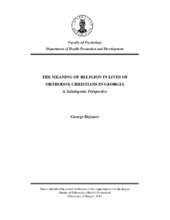The Meaning of Religion in Lives of Orthodox Christians in Georgia. A Salutogenic Perspective
Master thesis
Permanent lenke
https://hdl.handle.net/1956/6418Utgivelsesdato
2012-05-21Metadata
Vis full innførselSamlinger
Sammendrag
The present qualitative study was aimed to describe the meaning of religion in the lives of Orthodox Christians in Georgia through salutogenic perspective. Wittingly, to what degree people's descriptions of their experience with religion suggest that it contributes to well-being, through its influence on the Sense of Coherence (SOC), and which aspects of people's experience with religion contribute to well-being. The work definition of religion used in this research was: religion as a cognitive, emotional, valuative-attitudinal, interpersonal-relational and macrosociocultural characteristic of an individual, primary group, subculture or society (textural meaning) that is effective in avoiding or combating a wide variety of stressors and thus preventing tension from being transformed into stress (structural meaning). Eight orthodox Christians regardless age, gender, marital status or educational background, were selected from different laities. The criteria such as age, gender, professional status or church belonging were not used in this research due to the ethical issues. In-depth face-to-face interviews were conducted. Ethical clearance for the study was granted by the Tbilisi State Medical University Biomedical Research Ethics Committee and Norwegian Social Sciences Data Services. The immense role of religion as one of the generalized resistance resources is reflected in the textural meaning of work definition of religion used in this research. Degree of its influence to what do people's descriptions of their experience with religion contributes to well-being through SOC, by using faith as tool, is reflected in the structural meaning. Participants mostly referred to faith, concretely, to endowed by religion meaningful and comprehensive answers for the questions they had, as one of the coping strategies.
